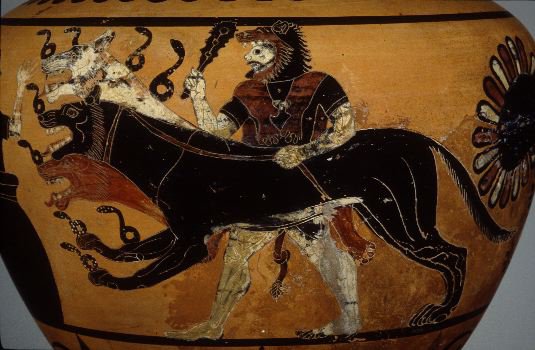Megara, Hercules' First Wife

Acropolis of Minyan Orchomenos from the south
Photograph courtesy of the Department of Archaeology, Boston University, Saul S. Weinberg Collection
After defeating the Minyans at Orchomenos, King Creon offered his eldest daughter, Megara, to Hercules as a bride in reward for his prowess in battle. Together, Hercules and Megara had anywhere between three and eight children. Although many different versions of Hercules' doomed marriage to Megara survive, Euripides' Heracles is the most popular account. There still remains much debate surrounding the sequencing of events.

Louvre E 701
Main panel: Hercules and Kerberos
Photograph by Maria Daniels, courtesy of the Musée du Louvre
According to Euripides, when Hercules returned home from his trip to the underworld to fetch Cerberus, he found Greece in chaos. During his absence, Lycus had come to Eubea to overthrow Creon and murdered him. At the precise moment of Hercules' return, Lycus was about to murder Megara and their children. Hercules rushed to the defense of his family and slew Lycus with an arrow. Just as Hercules was about to sacrifice to Zeus, however, Hera interfered, causing Hercules to fall into a state of delusion and rage. Hercules shot their children with his arrows, believing them to be Eurystheus' sons and not his own. (Although Apollodoros reports that Megara escaped and married Iolaus, Euripides reports that Hercules shot Megara too.) As Hercules was about to kill his own adopted father, Amphitryon, thinking him to be Eurystheus' father Sthenelus, Athena intervened and pelted Hercules on the chest with a rock, knocking him out cold and sending him into a deep sleep. Once Hercules awoke and realized what he had done, he was horrified by his actions and wanted to commit suicide. Luckily his friend Theseus was there to calm him down, eventually convincing Hercules to go into exile.
Traditionally, Hercules' momentary insanity is explained by Hera's desire to make Hercules commit a crime that would require atonement. Some versions say that following the murders, Hercules traveled to Delphi, and was instructed by the oracle to go to Tiryns and to serve Eurystheus for twelve years and perform any tasks that he might ask of him. If Hercules would complete these tasks and serve his sentence to Eurystheus in full, Hercules would be made immortal. The tasks that followed were to be known later as the labors of Hercules. |
(caw/acs)
This exhibit is a subset of materials from the Perseus Project and is copyrighted. Please send us your comments.
